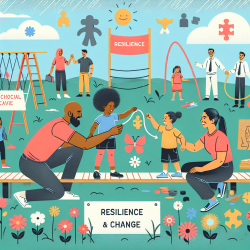In the ever-evolving landscape of mental health and psychosocial support, practitioners face the challenge of providing effective care to individuals who have experienced adversity. The Tutor of Resilience (ToR) model offers a transformative approach that empowers service providers to build resilience in their beneficiaries by focusing on strengths and culturally relevant interventions.
Understanding the Tutor of Resilience Model
The ToR model is designed to guide local service providers such as educators, social workers, and psychologists in creating interventions that are both contextually and culturally sensitive. The model emphasizes resilience as a social-ecological process that involves navigating personal and collective resources through supportive relationships.
This approach is particularly effective in humanitarian settings where children and youth are exposed to high-risk environments. By shifting the focus from deficits to strengths, the ToR model encourages practitioners to view beneficiaries not just as individuals with impairments but as capable individuals with untapped potential.
Core Principles of the ToR Model
- Focus on Strengths: Encourage practitioners to widen their perspective on beneficiaries by highlighting their strengths rather than focusing solely on impairments.
- Enhance Emotional Competence: Develop beneficiaries' emotional regulation skills to mitigate stress and improve psychosocial development.
- Strengthen Relationships: Foster trust and cohesion within families and communities to create supportive networks for beneficiaries.
- Culturally Relevant Interventions: Tailor activities to reflect the cultural context of beneficiaries, ensuring interventions resonate with their experiences and beliefs.
The Five-Phase Method for Implementation
The ToR model employs a five-phase method to ensure interventions are effective and culturally appropriate:
- Needs Analysis: Collaborate with local service providers to identify psychosocial needs and barriers faced by beneficiaries.
- Capacity Building: Conduct workshops that encourage self-reflection among trainees, emphasizing resilience-enabling principles.
- Action Plan Design: Develop a tailored action plan that incorporates resilience principles into community-based programming.
- Follow-Up: Review and refine interventions based on feedback from trainees, ensuring continuous improvement.
- Closure: Reflect on lessons learned and refine the ToR model for future applications in similar settings.
The Impact of the ToR Model
A case study involving Syrian and Lebanese children demonstrated the effectiveness of the ToR model in enhancing resilience. Practitioners reported increased self-efficacy, a better understanding of resilience paradigms, and improved relationships with beneficiaries. These outcomes highlight the transformative potential of the ToR model in diverse cultural contexts.
Encouraging Further Research
The success of the ToR model underscores the importance of continued research into resilience-building interventions. Practitioners are encouraged to explore further studies that expand on these principles, adapting them to new environments and populations. By doing so, they can contribute to a growing body of knowledge that supports effective psychosocial care worldwide.
To read the original research paper, please follow this link: Tutor of Resilience: A Model for Psychosocial Care Following Experiences of Adversity.










